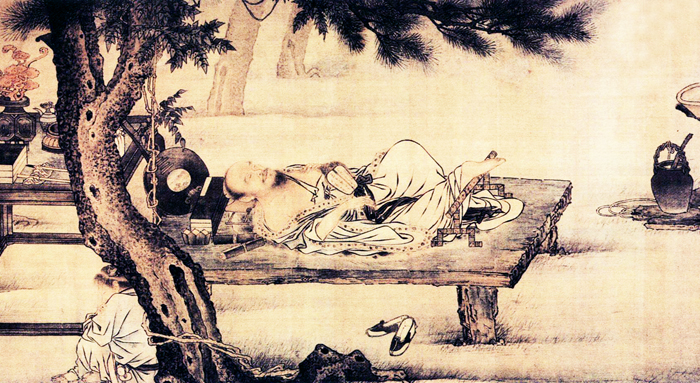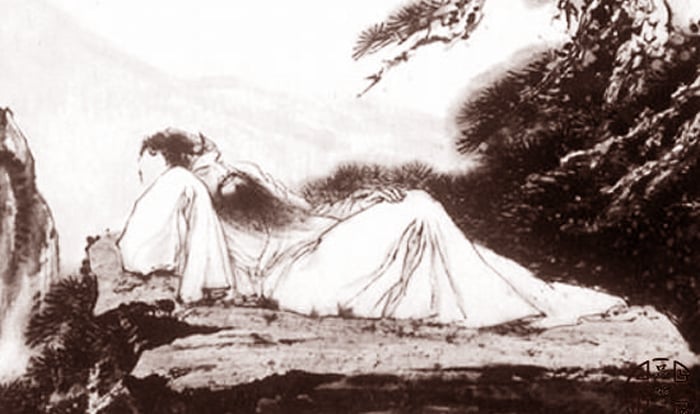The quote “Sleep is the product of regulating yin and yang” is very philosophical. Ancient people believed that during the day, the “yin” in the human body is hidden, and the “yang” plays a dominant role, and all body functions are in an active state. When night falls, the “yang” hides inside, the “yin” takes over, and it is time for humans to go to sleep.
But today, sleep, which is a basic necessity, has become a challenging issue for many people. It is not easy at all to sleep well for modern individuals.

For the ancients, sleep was a luxury and also a discipline (Illustration)
When to sleep and when to wake up?
We all know that in ancient times, great importance was placed on “Work when the day begins, rest when the sun sets.” For the ancients, sleep was a luxury and also a discipline.
So, what time did people in the past go to bed? The verse “Yiêm yiêm hoàng hôn hậu, tịch mịch nhân định sơ” (Dark shadows descend, peacefulness of night) in the poem “Eastern gate of the Eastern realm” during the Han Dynasty explains this very clearly – basically, everyone went to bed at the “nhân định” time.
When is the “nhân định” time? The ancient people divided a 24-hour day into 12 times, which are dạ đán, kê minh, nhật xuất, thực thời, ngung trung, nhật trung, nhật diệt, bộ thời, nhật nhập, hoàng hôn, nhân định. Correspondingly, there are also 12 zodiac signs to represent the time: Rat, Ox, Tiger, Rabbit, Dragon, Snake, Horse, Goat, Monkey, Rooster, Dog, Pig.
“Nhân định” is equivalent to the hour of the Dog, which is from 9 PM to 11 PM today. Therefore, “Nhân định” is also called “Định hôn” (Settling down), “Di dạ” (Night setting), implying that it is late in the evening and time to stop all activities and rest for sleep.
The ancients also emphasized the danger of going to bed too late. In the book “Ngũ tạp trở” by Tạ Chiêu Triết during the Ming Dynasty, it is written: “Dạ độc thư bất khả quá Tí thời”, which means that reading a book past midnight, specifically from 11 PM to 1 AM, can seriously affect health.
Another aspect is that the ancients admired waking up early. According to the notes in the book “Tống triều sự thực loại uyển” by Giang Thiếu Ngu during the Song Dynasty, Tống Thái Tông maintained the habit of a healthy sleep routine, “Sleep at midnight, wake up at cockcrow”. However, this requires that the court officials must rise early, around 3 AM to 5 AM today.
The writer Tô Đông Pha also never slept lazily, waking up every day “at cockcrow”. But after waking up, he did not immediately read or engage in activities. Instead, after combing his hair and getting dressed neatly, he would find a clean chair and close his eyes and lie down for a while, known as “giả mị” (pretend to sleep).
“Giả mị” is what we now refer to as a power nap or “dozing off”. Tô Đông Pha enjoyed doing this and also understood the wonder of it.

Tô Đông Pha lying on a rock (Illustration)
The sleeping position is particularly important
The sleeping position of modern people can be divided into three types: lying on the back, lying on the stomach, lying on the side. The sleeping position of ancient people can be summed up in the saying: “Stand tall like a pine tree, sit firmly like a bell, lie bent like a bow.”
The ancients did not like “lying flat”. Confucius strongly disliked this sleeping position. In “The Analects – Huong dang”, he said: “Lying flat is an uncivil habit.” When sleeping, one should not lie flat like a corpse, and when at home, one should not be bound, unnatural, or act as a guest.
Perhaps it was influenced by Confucius’s views, so the ancients were most averse to “lying straight”. Khổng Tử mentioned this sleeping position in his works and advocated sleeping with a curved body and bent knees to prevent the loss of vitality and to promote relaxation and blood circulation when awake.
Why is “lying bent like a bow” the best position for sleep? The physician Tôn Tư Mạc of the Tang Dynasty, in his book “Thiên kim yếu phương – đạo lâm dưỡng tính”, wrote: “Lying with a bent knee is more beneficial for the flow of energy than lying flat.”
The classic work of Daoism “Dao Tang – Hồn Nguyên Kinh” also has a similar view: “Lying bent is beneficial for the operation of energy in the human body and brings better health than lying flat.”
In “Trường sinh bất lão quyết” by Lý Khánh Viễn during the Qing Dynasty, it is also proposed that the best sleeping position is “lying on the side like a dog”. This can be considered an explanation for the teaching “lying bent like a bow” of the ancients, where everyone is required to sleep on their side, with a curved body, knees bent, arms folded, like an unborn baby sleeping in the mother’s womb, making all limbs, body parts, and bones relaxed and comfortable, preserving the internal vitality, and peacefully drifting into sleep.
Sleeping on the side, especially on the right side, which is called “cát tường thụy” (lucky sleep) in Buddhism, has been proven scientifically to be very reasonable and beneficial because, from an anatomical perspective, with this sleep position, the heart, liver, and internal organs are located on the right side, so this position can reduce the pressure on the heart.
How to Make Sure You Buy the Perfect Mattress for Optimal Sleep and Health
Want to know the essentials of selecting a quality mattress that will give you a peaceful night’s sleep and boost your health? Look no further! This article provides all the key advice for finding a mattress that suits your specific needs and ensures you get a well-deserved rest. Get the important information you need to make the perfect mattress choice right here.
Tips for Keeping in Shape During the EURO Tournament
As the start of the highly anticipated EURO tournament draws near, football fans are ready to enjoy the thrill of watching their favorite teams compete. But while the excitement of watching great matches on TV is boundless, it is imperative to remember to prioritize health and safety during this period. Therefore, keeping a few simple points in mind can help make the celebrations all the more enjoyable.





































